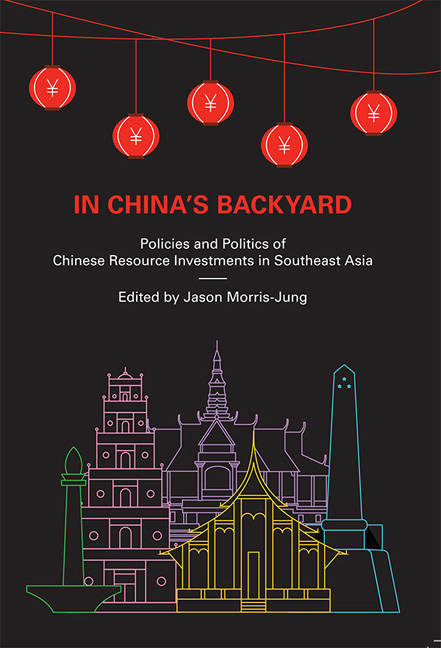Book contents
- Frontmatter
- Contents
- Foreword
- Acknowledgements
- About the Contributors
- 1 Introduction
- 2 Mixed Motivations, Mixed Blessings: Strategies and Motivations for Chinese Energy and Mineral Investments in Southeast Asia
- 3 Mineral Resources in China's “Periphery” Diplomacy
- 4 Energy Entanglement: New Directions for the China–Indonesia Coal Relationship
- 5 Indonesia–China Energy and Mineral Ties: The Rise and Fall of Resource Nationalism?
- 6 The Direction, Patterns, and Practices of Chinese Investments in Philippine Mining
- 7 Development Cooperation with Chinese Characteristics: Opium Replacement and Chinese Rubber Investments in Northern Laos
- 8 The High Cost of Effective Sovereignty: Chinese Resource Access in Cambodia
- 9 Complex Contestation of Chinese Energy and Resource Investments in Myanmar
- 10 Anti-Chinese Protest in Vietnam: Complex Conjunctures of Resource Governance, Geopolitics and State–Society Deadlock
- 11 Complexities of Chinese Involvement in Mining in the Philippines
- 12 Conclusion
- Bibliography
- Index
1 - Introduction
Published online by Cambridge University Press: 04 July 2018
- Frontmatter
- Contents
- Foreword
- Acknowledgements
- About the Contributors
- 1 Introduction
- 2 Mixed Motivations, Mixed Blessings: Strategies and Motivations for Chinese Energy and Mineral Investments in Southeast Asia
- 3 Mineral Resources in China's “Periphery” Diplomacy
- 4 Energy Entanglement: New Directions for the China–Indonesia Coal Relationship
- 5 Indonesia–China Energy and Mineral Ties: The Rise and Fall of Resource Nationalism?
- 6 The Direction, Patterns, and Practices of Chinese Investments in Philippine Mining
- 7 Development Cooperation with Chinese Characteristics: Opium Replacement and Chinese Rubber Investments in Northern Laos
- 8 The High Cost of Effective Sovereignty: Chinese Resource Access in Cambodia
- 9 Complex Contestation of Chinese Energy and Resource Investments in Myanmar
- 10 Anti-Chinese Protest in Vietnam: Complex Conjunctures of Resource Governance, Geopolitics and State–Society Deadlock
- 11 Complexities of Chinese Involvement in Mining in the Philippines
- 12 Conclusion
- Bibliography
- Index
Summary
Introduction
Across Southeast Asia, the “rise of China” has inspired both anticipation and anxiety. A common aspiration throughout the region is that a strong China means economic prosperity for all. The prevailing wisdom is that the sheer size of the world's second largest economy and its demands for trade will translate into jobs, business opportunities, and economic growth for neighbouring countries. These aspirations have been bolstered by China's leadership in establishing the US$100 billion Asian Infrastructure Investment Bank (AIIB), as well as its ambitions to retrofit ancient trade routes with twenty-first century infrastructure as part of its “One Belt, One Road” initiative. Now with hints of American influence in decline, many eyes are looking to China as the region's new benefactor.
If anticipation has been fuelled by visions of economic splendour, the anxieties have been more polysemic. Influxes of Chinese investment have been accompanied with waves of Chinese companies, workers and migrants, whose intermixing with local populations has generated both enthusiasm and distrust. The Chinese knack for keeping costs low has come with familiar concerns about social and environmental management practices, exploitation of local labour, and networks of chronyistic corruption. China's territorial claims and expanding military installations in the South China Sea have only helped to heighten geopolitical tensions both within and among individual Southeast Asian nations. Hence, while Chinese economic influence has been welcome, a stronger political, military and socio-demographic presence has been met with more equivocation, if not outright consternation.
Amid these tensions, Chinese resource sector investments have emerged as flashpoints of protest and controversy. From government orders to suspend the Chinese-backed Myitsone dam and Letpadaung copper mine in Myanmar to national protests over Chinese resource sector investments in Vietnam, the Philippines and elsewhere, resource projects have come to be a “focal point” for tensions and anxieties surrounding China's rise in Southeast Asia. Indeed, resource development is an interesting angle from which to examine China's future roles in Southeast Asia precisely because it reflects the contested nature of development.
Resource development is contested development. From “conflict minerals” to “resource curses”, political economies of resource development have been known to incite inter- and intra-state conflict, hinder socio-economic development, and bind already poor countries and communities into dependent relations with other more powerful nations.
- Type
- Chapter
- Information
- In China's BackyardPolicies and Politics of Chinese Resource Investments in Southeast Asia, pp. 1 - 26Publisher: ISEAS–Yusof Ishak InstitutePrint publication year: 2017



